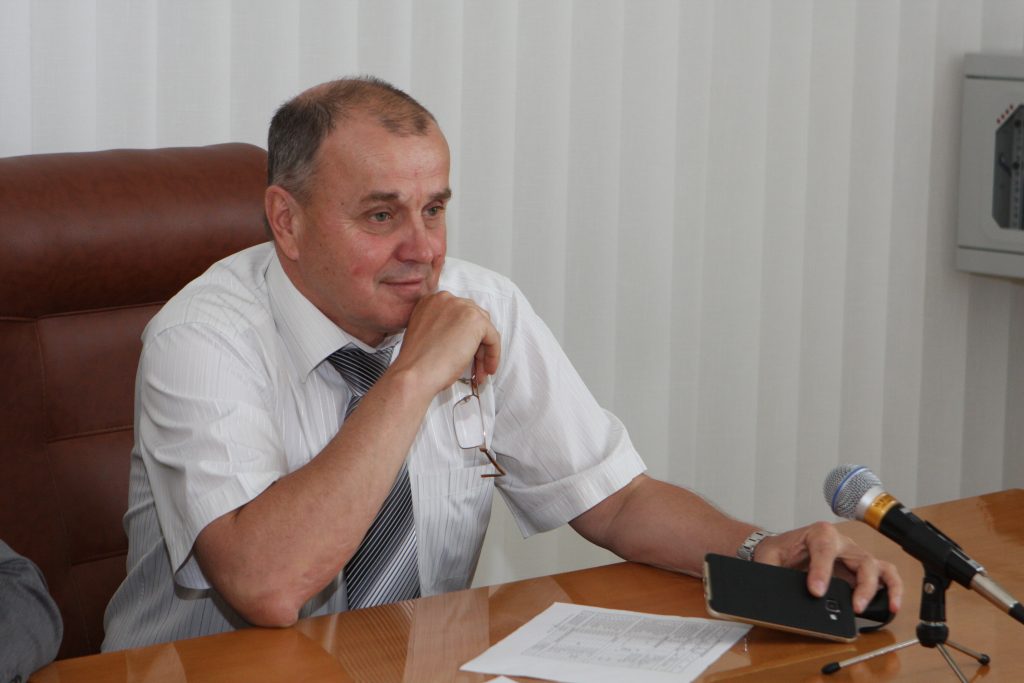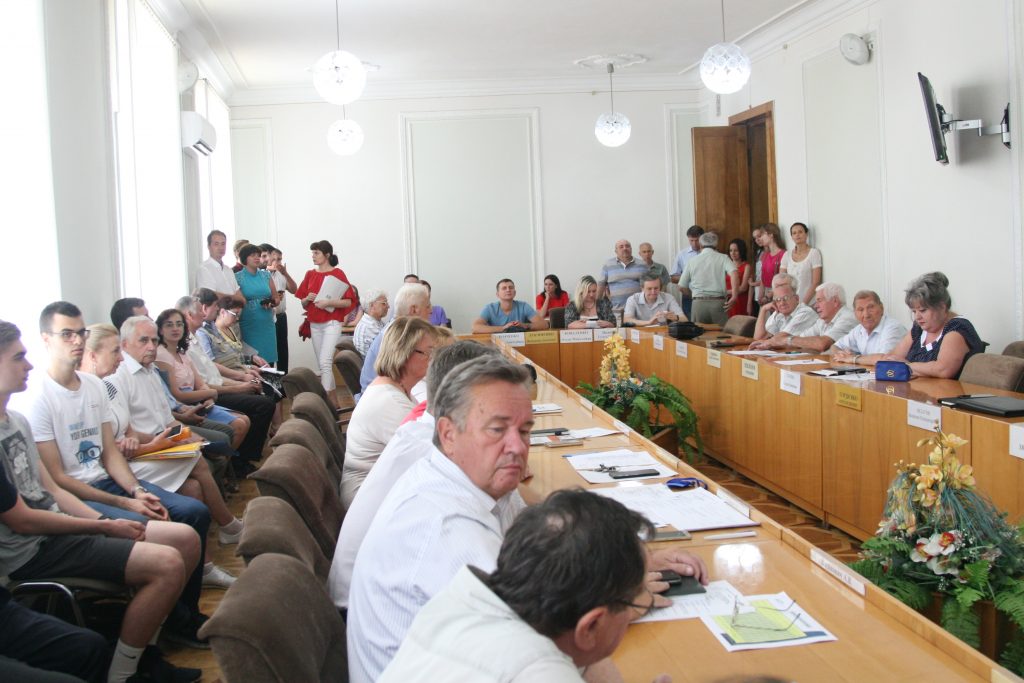On July 15, 2019, a regular meeting of the seminar on SDG took place. Two issues were considered: a report on the progress of achieving the Sustainable Development Goals (SDGs) from the Bertselmann Foundation’s SDG Index project in conjunction with the United Nations Network for Sustainable Development (SDSN), an analysis of U-Multirank’s 2019 ranking and an analysis of university faculties in 2018/2019 academic year.
Rector V.V. Semenets reported on the release of a new report (June 2019) on progress towards the Sustainable Development Goals (SDGs) from the Bertselmann Foundation’s SDG Index project in conjunction with the United Nations Network for Sustainable Development (SDSN). The report is based on many official and authoritative data sources, such as the World Bank, the World Health Organization, the International Labor Organization, data from various research centers and non-governmental organizations.
The report can be found at the link:
https://s3.amazonaws.com/sustainabledevelopment.report/2019/2019_sustainable_development_report.pdf
The report analyzes the dynamics of the achievement indices of each of the 17 SDGs for 193 UN member states. Ukraine ranks the 41st place.
As in 2017 and 2018, the countries of Northern Europe – Denmark, Sweden and Finland – lead the SDG Index. However, even these countries face serious problems in implementing one or more SDG s. No country is on track to reach all 17 SDG s at once. In Northern Europe, there are serious failures in # SDG 12 (Responsible Consumption and Production), # SDG 13 (Combating Climate Change), # SDG 14 (Preserving Marine Ecosystems) and # SDG 15 (Preserving Terrestrial Ecosystems).
Inequalities in income and wealth, as well as in health and education between different populations, also remain important societal challenges in both developed and developing countries.
In September 2019, the Heads of State and Government will meet in person at the UN in New York for the first time to review the implementation of their promises made four years ago with the adoption of the 2030 agenda.
SDGs can be implemented through transformations in 6 areas:
Education, gender and inequality.
Health, well-being and demographics.
Energy decarbonization and sustainable industry.
Overcoming hunger, stable land, water, oceans.
Sustainable cities and communities.
The digital revolution in the interests of sustainable development.
Trends in climate change (# SDG 13) and biodiversity (#SDG 14 and # SDG 15) are extremely negative. On average, countries receive the worst scores for # SDG 13 (Combating Climate Change), # SDG 14 (Preservation of Marine Ecosystems) and # SDG 15 (Preservation of Terrestrial Ecosystems). There is no country with a “green rating” (meaning the achievement of the goal) for # SDG 14. Trends in greenhouse gas emissions and the number of endangered species are directed against the desired.
Sustainable land use and healthy eating require comprehensive and related changes in agriculture, climate and health. Land use and food production do not meet people’s needs. Agriculture destroys forests and biodiversity, wastes water and emits a quarter of total greenhouse gases. In general, 78% of the countries from which the data are derived can be assigned a “red rating” (meaning the most problematic area) for sustainable nitrogen management. At the same time, one third of the food produced is simply thrown away; 800 million people are still malnourished; 2 billion are deficient in micronutrients; obesity due to poor quality food is growing.
High-income countries create significant environmental and socio-economic side effects. The implementation of the SDG at the national level should not undermine the ability of other countries to achieve these goals. For example, international demand for palm oil and other commodities is driving tropical deforestation.
Human rights and freedom of expression are under threat in many countries. Under # SDG 16 (Peace, Justice and Effective Institutions), fair and transparent institutions are recognized as goals not only in themselves but also as important levers for sustainable development. And their suppression in many parts of the world continues to slow and even reverse progress in achieving the SDG. Modern slavery and the proportion of prisoners without trial and investigation remain high, especially in low-income countries. Trends in corruption and press freedom are negative in more than 50 countries, including a number of middle- and high-income countries.
Eradicating poverty and strengthening justice remain important policy priorities. Eradicating extreme poverty remains a global problem, as half of the world’s countries are still not on track to achieve # SDG 1 (poverty eradication).


- The First Vice-Rector Ruban I.V. reported on the analysis of NURE indicators according to the U-Multirank rating for 2019. The indicators according to which NURE occupies leading positions, the indicators that need to be improved, the ways of further improvement of the university’s indicators in international rankings were noted.The analysis of U-Multirank rating indicators for 2019 can be found at the link: SDG_U_Multirank
- As always, the goal of the university is to fulfill the tasks to achieve SDG4 – “Quality Education”.In March-April 2019, the deans of the faculties of NURE at the conferences of the labor collectives of the faculties reported on the work of their structural units in 2018. The seminar analyzed the results of work, highlighted the positive and negative trends in the development of faculties, outlined ways to improve the indicators of scientific and educational components of the university, publishing activity, international integration, innovation and more.In particular, the indicators of teaching and methodological work of teachers increased at the faculties (the number of EML in comparison with 2017/2018 academic year increased from 1639 to 1998; the number of published textbooks and manuals doubled (from 20 last academic year to 40 in the reporting year) the number of published methodical materials increased from 94 to 136.
During the academic year, the university was worthily represented at 15 international, national and industry exhibitions, NURE was the organizer of 11 scientific conferences, including 10 international.
The representation of the university at international and All-Ukrainian Olympiads and competitions has improved. Students participated in 15 international competitions and scientific competitions, many of which won prizes. NURE students and teachers also successfully participate in 17 ERASMUS mobility programs (last academic year – 11 programs).
NURE continues to strengthen international relations. Many university employees took part in international business trips to participate in international conferences, research internships and partnerships.
After analyzing the results of the work of the faculties for the 2018/2019 academic year, the seminar participants identified ways to achieve the goals of sustainable development:
- directing research to urgent problem areas that define SDG: development of methods and tools for environmental protection, use of renewable energy sources, assistance in combating climate change, creation of flexible infrastructure, sustainable consumption and production, etc .;
- promoting the establishment and strengthening of international relations for the purpose of joint research;
- promotion of intersectoral partnership in the field of research (with medical institutions, with the energy sector, etc.);
- development of educational and research work at faculties: new content of existing scientific laboratories and their purpose on performance of actual scientific and practical researches; intensifying the search for research grants with the advantage of receiving European Commission grants.
- intensification of international cooperation and expansion of student exchange programs with the world’s leading universities.
